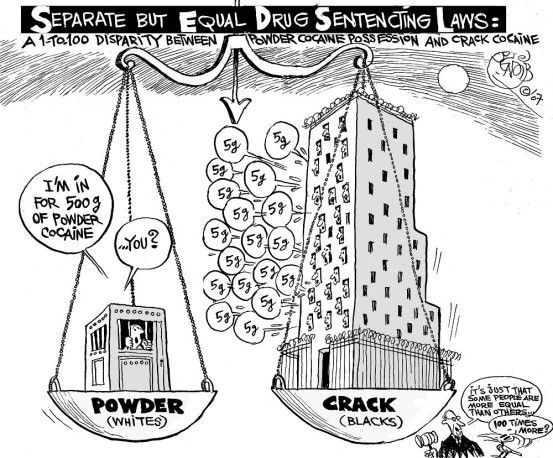
The US attorney general, Merrick Garland, moved to end sentencing disparities that have imposed different penalties for different forms of cocaine. This signaled an end to arbitrary drug policies that have worsened racial inequity in the US justice system.
For decades federal law has imposed harsher sentences for crack cocaine even though it isn’t scientifically different from powder cocaine, creating “unwarranted racial disparities,” Garland wrote in a memo Friday to federal prosecutors. “They are two forms of the same drug, with powder readily convertible into crack cocaine.”
With changes to the law stalled in Congress, Garland instructed prosecutors in non-violent, low-level cases to file charges that avoid the mandatory minimum sentences that are triggered for smaller amounts of rock cocaine.
Civil rights leaders and criminal justice reform advocates applauded the changes, though they said the changes would not be permanent without action from Congress. The Rev Al Sharpton led marches in the 1990s against the laws he called “unfair and racially tinged” and applauded the justice department direction, which takes effect within 30 days.
“This was not only a major prosecutorial and sentencing decision – it is a major civil rights decision. The racial disparities of this policy have ruined homes and futures for over a generation.” ~Reverend Al Sharpton
At one point, federal law treated a single gram of crack the same as 100 grams of powder cocaine. Congress narrowed that gap in 2010 but did not completely close it. A bill to end the disparity passed the House last year but stalled in the Senate.
“This has been one of the policies that has sent thousands and thousands of predominantly Black men to the federal prison system,” said Janos Marton, vice-president of political strategy with the group Dream.org. “And that’s been devastating for communities and for families.”
While he welcomed the change in prosecution practices, he pointed out that unless Congress acted, it could be temporary. The bill that passed the House with bipartisan support last year would also be retroactive to apply to people already convicted under the law passed in 1986.
The Black incarceration rate in the US exploded after the Anti-Drug Abuse Act of 1986 went into effect. It went from about 600 per 100,000 people in 1970 to 1,808 in 2000. In the same timespan, the rate for the Latino population grew from 208 per 100,000 people to 615, while the white incarceration rate grew from 103 per 100,000 people to 242.
The mandatory-minimum policies came as the use of illicit drugs, including crack cocaine in the late 1980s, was accompanied by an alarming increase in homicides and other violent crimes nationwide.
The act was passed shortly after an NBA draftee died of a cocaine-induced heart attack. It imposed mandatory federal sentences of 20 years to life in prison for violating drug laws and made sentences for possession and sale of crack rocks harsher than those for powder cocaine.
Friday’s announcement reflected the ways that years of advocacy had pushed a shift away from the “war on drugs” tactics that took a heavy toll on marginalized groups and drove up the nation’s incarceration rates without an accompanying investment in other services to rebuild communities, said Rashad Robinson, president of Color of Change.
“It is a recognition these laws were intended to target Black people and Black communities and were never intended to give communities the type of support and investments they need,” he said.
My opinion? It’s about time. The sentencing disparity between crack and powder cocaine was racist. It was never based in sound policy, and has not improved public safety. Far from it — it is science fiction that has driven racial disparities, bloated our carceral system, and ruined thousands of lives.
Please contact my office if you, a friend or family member are charged with a crime. Hiring an effective and competent defense attorney is the first and best step toward justice.






